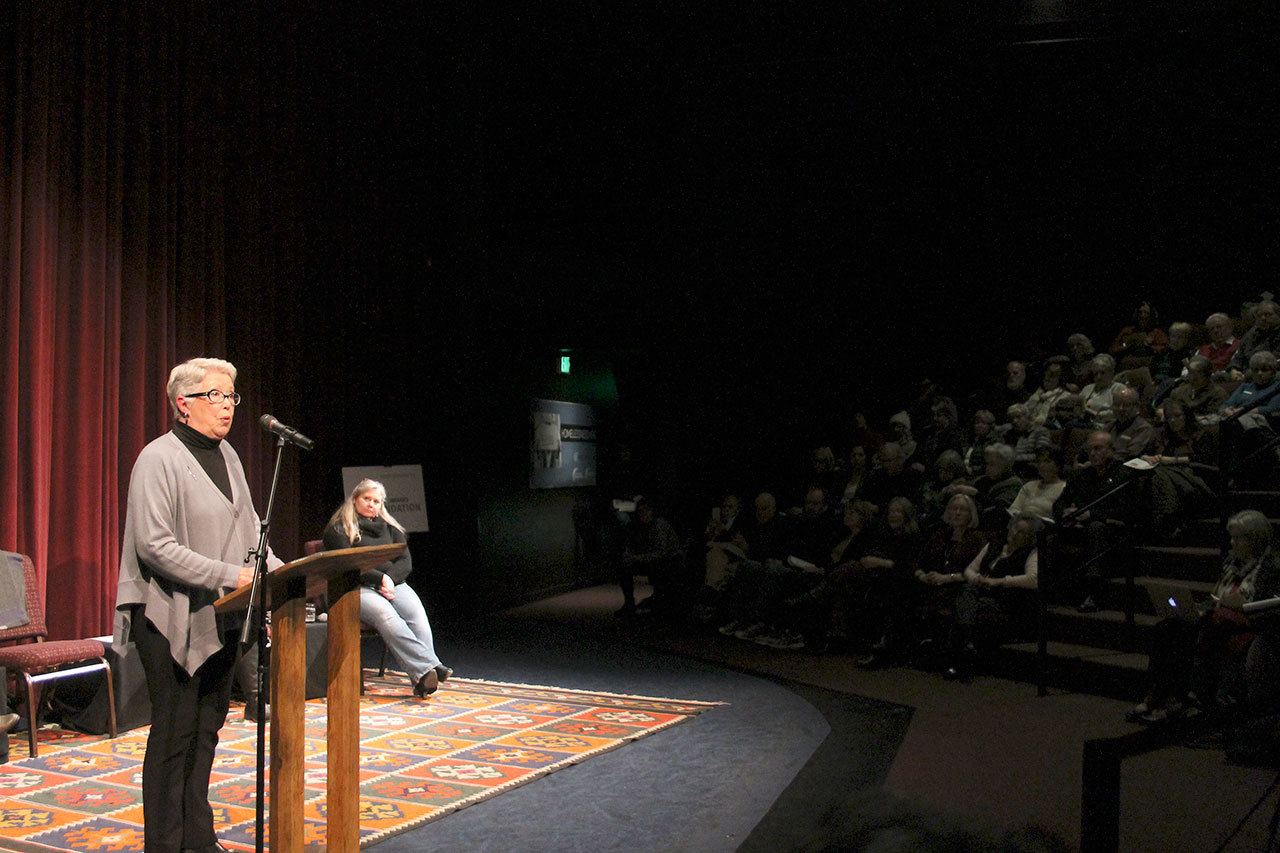A community discussion about homelessness on Whidbey drew a crowd of about 150 concerned residents to a packed Whidbey Island Center for the Arts last Tuesday.
Those in attendance were eager to know how the number of homeless individuals got to where it is today and what the county, and organizations that serve the homeless, are doing to combat the issue. After audience members posed questions about issues such as affordable housing, the warming center in Langley and zoning laws, the response from some of the presenters was, “We’re working hard on it.”
“We’re grateful that this church (Langley United Methodist Church), despite needing to be under 35 degrees to open, could at least come this far so there is a place for people to go,” Faith Wilder, president of the Whidbey Homeless Coalition, said. “We know it needs more, and that’s why we’re working hard for an every night shelter. We recognize you, we see you and we hear you.”
Wilder’s remark that “we’re working hard on it” echoed the tone for much of the meeting; many in the audience were frustrated to see the number of homeless individuals increase, and would like something to be done to decrease those numbers. But according to the group of speakers who presented at the discussion, the complicated issue is not easily resolved and takes time for solutions to reap results.
Island County Department of Human Services reports 222 homeless individuals living in Island County in 2016. That’s a 34 percent increase from 2015, although that number is inflated due to outreach to Camano Island. The numbers come from a snapshot of the actual homeless population, as the numbers are gathered by accounting for those who utilized county services.
Four panelists chimed in on the issue: Joanne Pelant, housing resource coordinator with Island County Department of Human Resources; Lori Cavender, founder of Ryan’s House for Youth; Vivian Rogers Decker, founder of SPIN Café in Oak Harbor; and Wilder. Sheriff Mark Brown and county commissioner Helen Price Johnson were also in attendance. The public discussion was held by Sno-Isle Libraries as part of their “Issues that Matter” series.
The mixture of county officials and nonprofit organization leaders gave audience members a comprehensive idea of the actions being taken to reduce homelessness on Whidbey. The county opened a new housing support center in August that refers people to agencies that help them locate housing, such as transitional housing, permanent supportive housing and emergency shelters, Pelant said. But she recognized the county needs more of this housing.
“We must continue to move forward with the continuum we have today, but we need more,” Pelant said. “We still have some major gaps.”
The Whidbey Homeless Coalition is making an effort to close one of those gaps for emergency shelters. The nonprofit currently organizes a warming center at Langley United Methodist Church, but is aiming to establish one that is open nightly in Oak Harbor. The current warming center is only open when the weather dips below 35 degrees, which some audience members took issue with. They felt a warming center was also needed when temperatures hovered around 40 degrees, or even any temperature below 50 degrees.
In the discussion, Pelant also brought up a 30-person affordable housing task force she facilitates. The task force aims to generate creative ideas to resolve the affordable housing crisis.
“We are encouraged that elected officials are becoming proactive about this and are making this one of their priorities,” Pelant said.
A recurring point of discussion during public comment was certain zoning laws, such as those that require homes to be at least 750 square feet. Audience members proposed amending the zoning laws to allow for pod-style apartments as small as 450 square feet in order to supply more affordable housing. And according to Price Johnson, zoning laws have been on the minds of county officials.
“Over the next year, the county will be talking more and more about the zoning issues and the opportunity we have to address this need,” in unincorporated areas and cities and towns, Price Johnson said.



